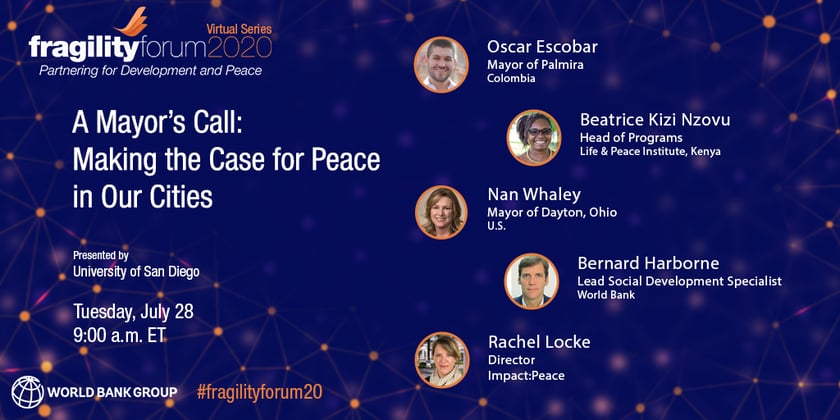"There is no textbook on how to deal with violence during pandemics."
The virtual panel featured insights from Mayor Oscar Escobar of Palmira, Colombia, who provided our headline quote; Mayor Nan Whaley of Dayton, Ohio; Beatrice Nzovu of the Life & Peace Institute in Nairobi, Kenya; and Bernard Harborne of the World Bank. Peace in Our Cities members Mayor Clara Luz Flores of Escobedo, Mexico, and Mayor Abezoua Jules of the first Arrondissement in Bangui, Central African Republic, also contributed remarks via pre-recorded videos.
Mayor Escobar of Palmira emphasized the importance of a global network during this time to ensure that mayors and civil society actors are able to learn with each other in real time to simultaneously reduce the impact of the virus and lower levels of violence in urban areas. Across very diverse geographic contexts, all the speakers highlighted that this moment is one of opportunity – an opportunity to take the inequities exposed by the pandemic and ensure that response mechanisms address acute public health impacts while also addressing structural inequalities within their communities; transforming their cities into more just and peaceful places to live.
You can view the full session at this link.
To learn more about Impact:Peace and the Peace in Our Cities Campaign, visit our website.
Contact:
Justin Prugh
jprugh@sandiego.edu
(619) 260-7573

About the Author
The Joan B. Kroc School of Peace Studies (Kroc School) at the University of San Diego is the global hub for peacebuilding and social innovation. Founded in 2007, the Kroc School equips the next generation of innovative changemakers to shape more peaceful and just societies. We offer master's degrees in peace and justice, social innovation, humanitarian action, conflict management and resolution, and a dual degree in peace and law — programs that have attracted diverse and dynamic students from more than 50 countries. In addition to our graduate programs, the Kroc School is home to the Kroc Institute for Peace and Justice (Kroc IPJ). Founded in 2001, the Institute supports positive change beyond the classroom. Through groundbreaking research, experiential learning, and forward-thinking programs, the Kroc School and Kroc IPJ are shaping a future in which peaceful co-existence is the new normal.






